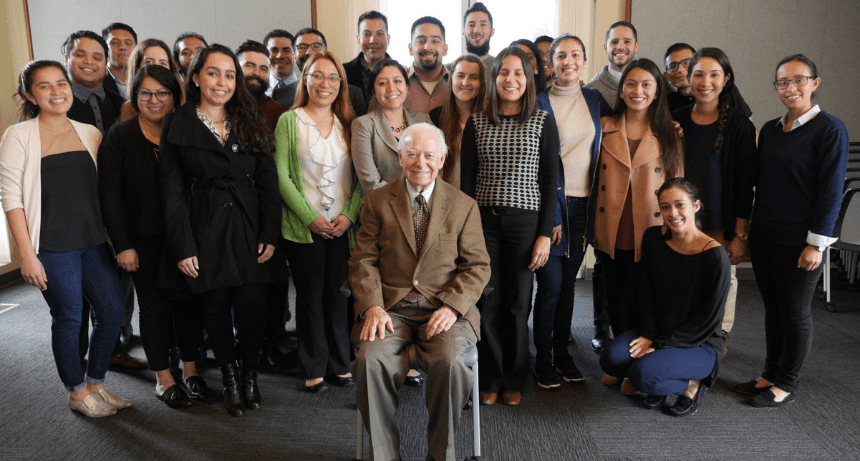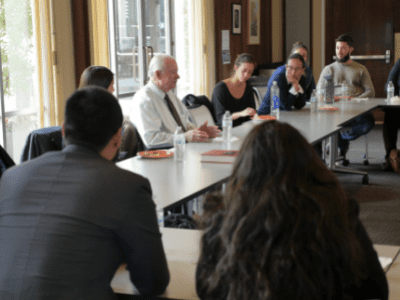
By Andrew Cohen
For many in the Berkeley Law community, especially those of Latinx descent, Cruz Reynoso ’58 represents a towering figure. The son of Mexican immigrant farm workers, Reynoso went from working in the fields as a child to becoming the California Supreme Court’s first Latinx justice and an iconic public servant over his remarkable career.
But for students, faculty, and alumni mourning his death on May 7 at age 90, Reynoso is also remembered for his generosity, modesty, and commitment to helping underrepresented students achieve a career in law.
“Cruz Reynoso was a role model for all of us in how to use one’s career to advance social justice,” says Berkeley Law Dean Erwin Chemerinsky. “He accomplished so much and did so with such warmth and humility. He will be enormously missed.”
Each year, the Cruz Reynoso Fellowship supports Latinx Berkeley Law students pursuing otherwise unpaid summer public interest internships and judicial externships. Before the annual gala that helps fund those fellowships, members of La Alianza (formerly the La Raza Law Students Association) would hold a luncheon with Reynoso.
“We loved listening to Justice Reynoso talk about his ‘justice bone’ because it reminded us that we could make a difference,” says Maria Beltran ’19, who chaired the 2018 gala. “He reminded us to maintain our conviction, have courage, and center our communities. He was a trailblazer for us all. So many of us were heartbroken to hear of his passing, but we know that his spirit and justice bone lives on in all of us, and the countless Latinx students who have yet to grace Berkeley Law’s halls.”
Have a story to tell about Reynoso? Share your memories here.
That year, the gala expanded to provide bar stipends to graduating law students embarking on public interest careers. For Erika Hernandez ’18, who also played a lead role in planning the event, providing quality legal services to underserved communities — and advancing underrepresented students’ legal careers — honor Reynoso’s legacy.
“The annual luncheon was especially meaningful because Justice Reynoso sat down with a small group of us and shared his experiences in an intimate setting,” she recalls. “Many of us are immigrants, first-generation Americans, or the first in our families to attend professional school. We hadn’t had much access to leaders in the legal profession, much less advice from a justice with a similar upbringing or a name that sounded like ours. Justice Reynoso made us feel like there was a place for us in the legal profession.”
A determined public servant
The recipient of numerous awards over his 50-plus years in public service, including the Presidential Medal of Freedom in 2000, Reynoso became a heralded civil rights advocate whose work buoyed immigrants, farm workers, and the rural poor. An award-winning 2010 documentary about his life, “Cruz Reynoso: Sowing the Seeds of Justice,” highlighted his early drive for equity.

It included protesting segregated schools and leading a successful petition effort to the U.S. Postmaster General for rural mail delivery — spurred by the post office not bringing mail to the Latinx barrio where his family lived.
In 2014, as part of his National Hispanic Hero Award ceremony, Reynoso described his longtime commitment to social justice.
“That means real justice, not just legal justice,” he said. “Are we doing what we should in terms of medical attention to all of our people? Are we doing what we should in terms of educating our young people? Are we doing everything we need to do in terms of making sure the laws truly represent the interests of the people? Do we have real justice for all the people in this state and this country and this world? That’s really what I’ve devoted my life to.”
Reynoso spent two years in the Army before attending Berkeley Law. He started his own practice in California’s Imperial Valley, and later joined the area chapter of a Latinx civil rights organization called the Community Service Organization — led by César Chávez.
After serving as associate general counsel of the Equal Employment Opportunities Commission, Reynoso became the first Latinx director of California Rural Legal Assistance in 1968. His tireless efforts in that role led to important physical and environmental protections for farm workers.
“My favorite part of gala planning was playing clips about Justice Reynoso’s life for first-year Latinx law students,” says 2020 gala co-chair Rosa Hernandez ’21. “For many students, it was the first time they learned about his life and his advocacy for migrant farm workers. Justice Reynoso’s background mirrored our own and his achievements were those we aspired to. His story showed we belonged in law school, the legal community, and on the bench.”
Reynoso spent four years as a law professor at the University of New Mexico before being named a California state appeals court judge in 1976. Five years later, Gov. Jerry Brown appointed Reynoso to the California Supreme Court, calling him “a man of outstanding intellect, superior judicial performance, high integrity, and … rare personal qualities.”
Teacher, mentor, inspiration
Hailed for his attention to detail and conscientious approach as a jurist, Reynoso wrote the court’s opinion ruling that interpreters must be provided to non-English-speaking defendants at each phase of the criminal process. But in 1986, Reynoso, Rose Bird ’65, and Joseph Grodin were voted off the California Supreme Court after a well-funded recall movement alleged that they did not enforce the death penalty and were too lenient with criminals.
Reynoso later served for 11 years with the U.S. Commission on Civil Rights, where he was vice chair. He became a UCLA Law professor in 1991, and joined the law faculty at UC Davis in 2001. Berkeley Law lecturer Fernando Flores, who took Reynoso’s Labor Law, Professional Responsibility, and Remedies courses there, describes him as a remarkable advocate, professor, and mentor.
“As the first person in my family to enter the legal profession, Professor Reynoso provided me with some of the most powerful guidance that I still practice today,” Flores says. “He shared his journey of advocating for farmworkers and taught his students, who eventually became his friends, to be kind, do what’s right, serve others, be humble, and learn to write well so that you can be an effective advocate. Professor Reynoso was also one of the first attorneys who I saw lead with his heart. I will forever be grateful for that important lesson.”
Reportedly the only Latinx member of his law school graduating class, Reynoso “would tell us that if he had been in La Raza while he was at Berkeley, he would have been the president, vice president, treasurer, and secretary,” Beltran recalls.
Over the years, his efforts helped improve that landscape. As of October 2020, Berkeley Law had 125 Latinx J.D. students. The school also has one of the only journals at a top school focused on Latinx issues (the Berkeley La Raza Journal) and co-hosted the National Latina/Latino Law Students Association Conference in 2019.
Still, with a 2019 American Bar Association report showing that Latinx people make up 18 percent of the U.S. population but only 5 percent of its lawyers, sustaining Reynoso’s legacy is a vital priority for those he influenced.
Recalling one of his Berkeley Law talks while she was a student, Sacramento County Superior Court Judge Emily Vasquez ’77 said in 2014 that “he inspired all of us with his vision of justice for all — that justice should be the same in substance and availability to all, without regard to economic status. Since then, I’ve had the wonderful opportunity to see how Justice Reynoso moves and inspires generations of other law students.”